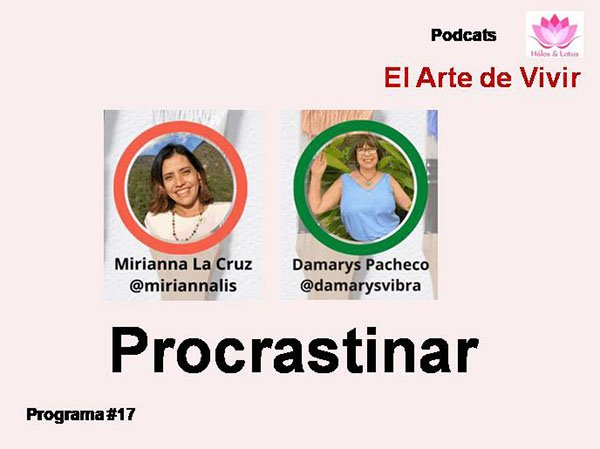
"Procrastinar o no procrastinar" es el título del podcast que ayer, 31 de agosto de 2022, manejamos en “El Arte de Vivir”. Un título provocador para abrir una sana discusión sobre un tema que quizás, pocos, muchos o todos, en algún momento, por diversas razones lo hemos vivido.
El programa se enfocó en caracterizar las múltiples caras de la procrastinación, los sentimientos que la envuelve y algunas sugerencias para romper el círculo procrastinador. Para ello @miriannalis, nuestro invitado a la mini-entrevista @emiliorios, todos los participantes que se unieron a la tertulia y mi persona fuimos aportando desde nuestros conocimientos el cómo vivimos y trabajamos la procrastinación. Para todos los presentes: Gracias, gracias.
Si algo caracteriza a la persona procrastinadora es el uso frecuente de frases postergadoras: el lunes comienzo, mañana lo hago, voy a empezar en serio, dentro de un ratico… Ahora bien, es bueno distinguir ese dejar para después de la flojera, el no hacer las cosas por decisión propia, bien sea porque consideramos que tal acción no tiene sentido hacerlo, porque no nos conviene hacerlo o porque realmente nuestra planificación del tiempo no estuvo muy acertada y este no nos alcanzó.
No, la procrastinación es otra cosa es dejar de hacer algo aún sabiendo que nos perjudica, es una manera de evadir haciendo otras cosas para no afrontar una toma de decisión, una responsabilidad o una acción que sabemos que tenemos que realizar.
De allí que una de sus características definitorias es que nos produce malestar interior porque con ella nos sentimos culpables, llega el remordimiento y un ruido mental que no da descanso. En los momentos más inesperado llega la idea de lo no realizado y es cuando nos decimos: tengo que hacerlo, no puedo esperar que sigan pasando los días, ya se acerca la fecha y aún no me he puesto. Hay dos palabras claves en el acto de procrastinar: evadir y malestar.
Entonces es bueno preguntarse cuáles emociones están detrás de la procrastinación
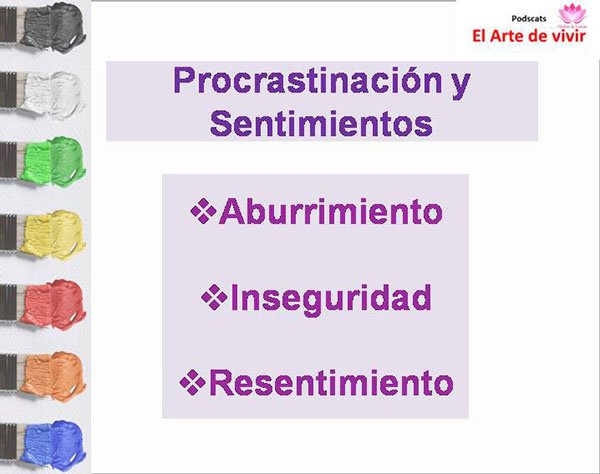
Aburrimiento: Posiblemente la más frecuente sea el aburrimiento ese desinterés por la tarea pendiente, no encontramos en ella ninguna motivación ni recompensa alguna después de hacerla.
Inseguridad: dudamos de nuestra capacidad para culminar la actividad y hacerla bien.
Resentimiento: Esta se encuentra muy relacionada con el sentimiento de injusticia. La tarea nos parece que no nos corresponde hacerla, que las cargas no están equilibradas.
Al respecto @emiliorios enfatizó que desde el ámbito médico, la procrastinación acarrea un deterioro de la salud mental porque en ella se manifiestan unas emociones que desestabilizan a la persona y que detrás de estas lo que se encuentra es el miedo a afrontar realidades y utilizamos otras actividades para evadirnos, reafirmando, que la procrastinación es producto de no darle frente a las emociones que nos produce las diversas situaciones que presentan dificultades y nos quedamos atrapados sin buscar estrategias para salir de la situación.
Entre las consecuencias emocionales que nos trae la procrastinación tenemos:
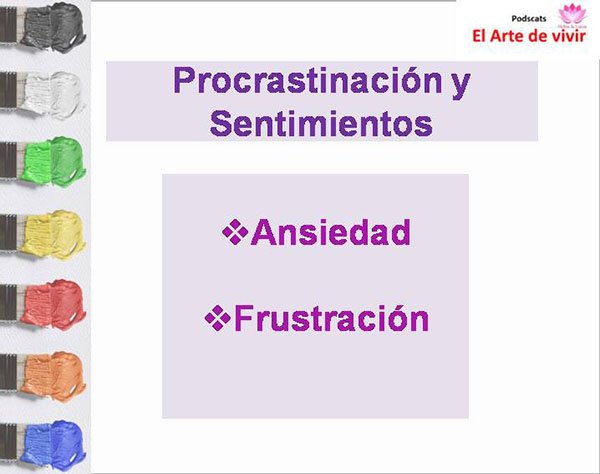
Ansiedad. Darle largas a un asunto que tenemos pendiente es ir llenando la mochila haciéndola más pesada, este peso se traduce en preocupación que nos mantiene atados al — tengo que hacer-no he hecho— creándonos un estado constante de apremio, una sensación agobiante de que tenemos muchos pendientes y que el tiempo no nos alcanza.
Frustración. Fijarnos una meta, tener una responsabilidad y no cumplirla nos llena de un sentimiento de frustración que se traduce en considerar que nos falta capacidad o compromiso para llevarlo a cabo, con sus consecuentes daños colaterales a nuestro auto-concepto y que va creciendo exponencialmente en la medida en que más cosas dejamos para luego convirtiéndose en un ciclo que a veces se dificulta romper.
@miriannalis por su parte nos presentó un tets para ayudarnos a determinar que tan procrastinadores somos y la verdad es que resultó divertido el asunto porque las respuestas tuvieron una clara tendencia hacia el “a veces”, reconociéndonos procrastinadores en algunos aspectos.
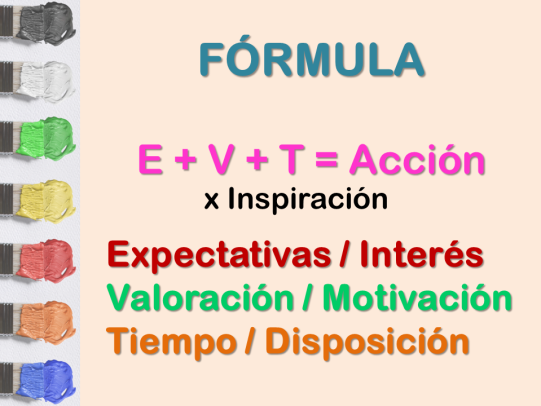
Seguidamente nos presentó una fórmula que recoge los elementos que nos llevan a la acción en contraposición con la procrastinación, resaltando que es el interés por lo que hacemos, las motivaciones y disposición que tengamos es lo que nos mueve hacia una acción entonces cuando estamos ante una situación que no le “vemos” algunos de estos valores tendemos a dejarlo para después.
En este sentido la idea es encontrar las “razones” de por qué hacerlo y desde allí realizar la acción. Colocó como ejemplo una visita médica, la cual hemos ido posponiendo, si nos detenemos y comenzamos a valorar su importancia para nuestra salud y bienestar encontraremos los componentes precisos de la fórmula y pasaremos a la acción.
Con esta idea entramos a las sugerencias que nos trajo para superar la procrastinación, siempre haciendo la salvedad de que cada uno encuentra su manera, aquello que realmente le funcione.
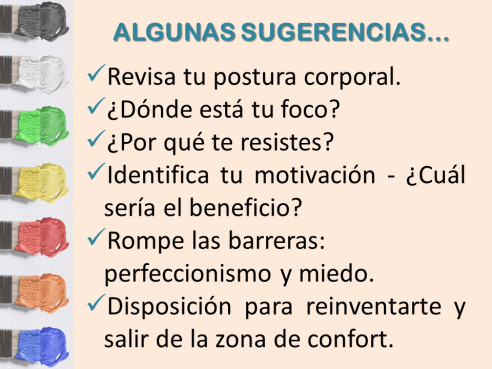
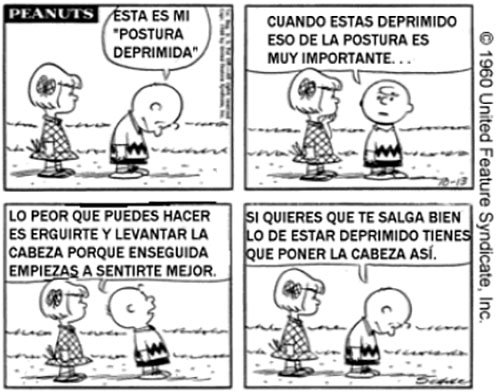
Revisa tu postura corporal. La postura corporal habla de nosotros, de cómo estamos y nos sentimos, este mensaje no es solo para los demás también es para nosotros mismos, con nuestra postura le estamos enviando un mensaje al cerebro de ese estado en que nos encontramos. Para ilustrarlo nos trajo una imagen muy elocuente que describe perfectamente este punto.
¿Dónde está tu foco? En lo que quieres alcanzar, en tus metas o en aquello que no te deja accionar.
¿Por qué te resistes? Quizás es una de las preguntas más importante que nos podemos hacer y cuya respuesta es posible que requiera que reflexionemos cuidadosamente en ello porque cuando conocemos lo que nos produce resistencia podemos trabajarlo para salir de la situación.
Identifica tu motivación ¿Cuál sería el beneficio. Se encuentra muy relacionada con la Fórmula trabajada, cuando hayamos los beneficios que una acción nos traería tenemos nuestros motivadores.
Rompe las barreras del perfeccionismo y el miedo. Son dos limitaciones para la acción. A veces dejamos de hacer las cosas porque pensamos que estas deben salirnos perfectas y si bien es cierto que la perfección es algo subjetivo colocar nuestro mayor esfuerzo en lo que hacemos es el ideal, no dejar que este miedo al error, a no llenar expectativas nos arrope es tiende a disminuir en la medida que vamos avanzando en un paso a paso, lo más importante es comenzar.
Disposición para reinventarte y salir de la zona de confort. Estar dentro del marasmo de la procrastinación requiere que nos revisemos para encontrar allí aquello que nos llena y apasiona y salir de ese espacio al que nos hemos ido acostumbrando aún sabiendo que podemos transformarnos.
Para cerrar nos recordó estas tres palabras claves para lograr cambios.
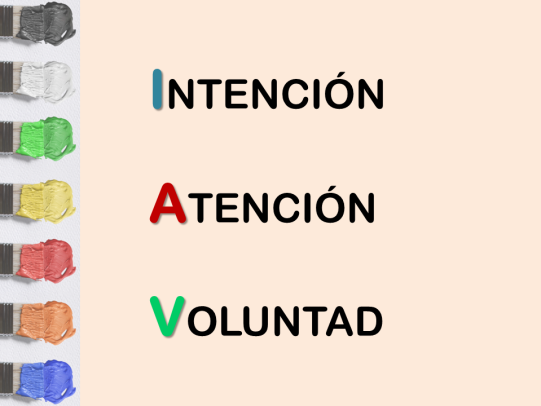
La procrastinación nos resta energía, vitalidad, va apagando la motivación y el entusiasmo sacándonos del bienestar tanto interno como externo, prestarle atención y trabajar en ello es una gran meta porque el Arte de Vivir radica en hacer de cada día, el mejor día.

In English
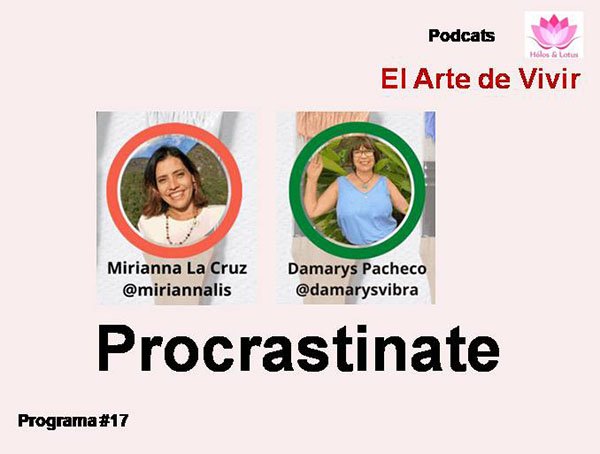
"To procrastinate or not to procrastinate" is the title of the podcast that yesterday, August 31, 2022, we managed in "The Art of Living". A provocative title to open a healthy discussion on a topic that, perhaps, few, many or all of us, at some point, for various reasons have experienced it.
The program focused on characterizing the multiple faces of procrastination, the feelings that surround it and some suggestions to break the procrastinating circle. For this @miriannalis, our guest to the mini-interview @emiliorios, all the participants who joined the get-together and myself were contributing from our knowledge how we live and work procrastination. To all present: Thank you, thank you.
If something characterizes the procrastinator is the frequent use of procrastination phrases: Monday I start, tomorrow I do it, I'm going to start seriously, in a little while... Now, it is good to distinguish this procrastination from laziness, not doing things by choice, either because we consider that such action does not make sense to do it, because it is not convenient to do it, or because our time planning was not very successful and we did not have enough time to do it.
No, procrastination is something else, it is to stop doing something even though we know that it will harm us, it is a way of evading, doing other things to avoid facing a decision, a responsibility or an action that we know we have to do.
Hence, one of its defining characteristics is that it produces inner discomfort because with it we feel guilty, remorse and a mental noise that gives us no rest. In the most unexpected moments comes the idea of the unrealized and that is when we say to ourselves: I have to do it, I can't wait for the days to go by, the date is approaching and I still haven't started. There are two key words in the act of procrastinating: avoidance and discomfort.
So it's good to ask yourself which emotions are behind procrastination.
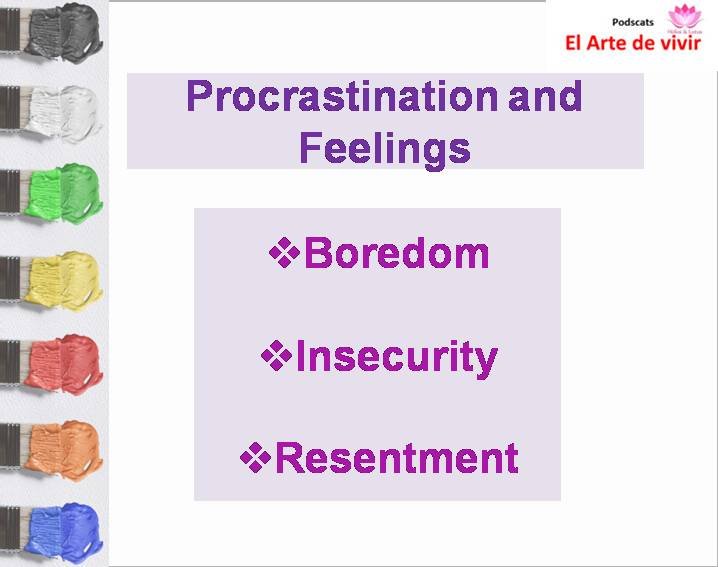
Boredom. Possibly, the most frequent is boredom, that disinterest in the pending task, we do not find in it any motivation or reward after doing it.
Insecurity we doubt our ability to complete the activity and do it well.
Resentment. This is closely related to the feeling of injustice. The task seems to us that it is not ours to do, that the burdens are not balanced.
In this regard, @emiliorios emphasized that from the medical point of view, procrastination causes a deterioration of mental health because it manifests emotions that destabilize the person and that behind these emotions is the fear of facing realities and we use other activities to evade, reaffirming that procrastination is the result of not dealing with the emotions produced by the various situations that present difficulties and we are trapped without looking for strategies to get out of the situation.
Among the emotional consequences that procrastination brings us we find:
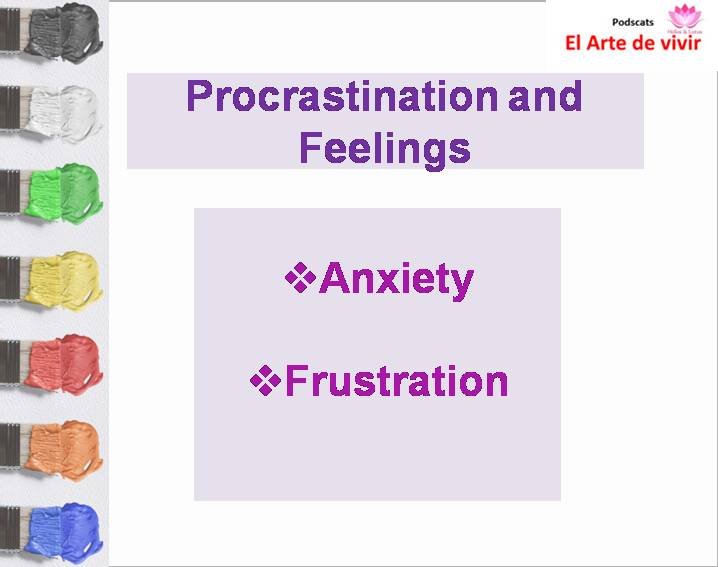
Anxiety. Procrastinating is filling the backpack making it heavier, this weight translates into worry that keeps us tied to the -I have to do-I have not done- creating a constant state of urgency, an overwhelming feeling that we have many pending issues and that time is not enough.
Frustration Setting a goal, having a responsibility and not fulfilling it, fills us with a feeling of frustration that translates into considering that we lack the capacity or commitment to carry it out, with its consequent collateral damage to our self-concept and that grows exponentially as we leave more things for later, becoming a cycle that is sometimes difficult to break.
@miriannalis presented us with a test to help us determine how much of a procrastinator we are and the truth is that it was fun because the answers had a clear tendency towards "sometimes", recognizing us as procrastinators in some aspects.

Then, he presented us with a formula that gathers the elements that lead us to action as opposed to procrastination, highlighting that it is the interest in what we do, the motivations and disposition we have that move us towards an action, so when we are faced with a situation that we do not "see" some of these values we tend to leave it for later.
In this sense, the idea is to find the "reasons" why to do it and from there to take action. He gave as an example a medical visit, which we have been postponing, if we stop and begin to value its importance for our health and well-being we will find the precise components of the formula and we will take action.
With this idea we enter the suggestions brought to us to overcome procrastination, always making the caveat that everyone finds their own way, what really works for them.
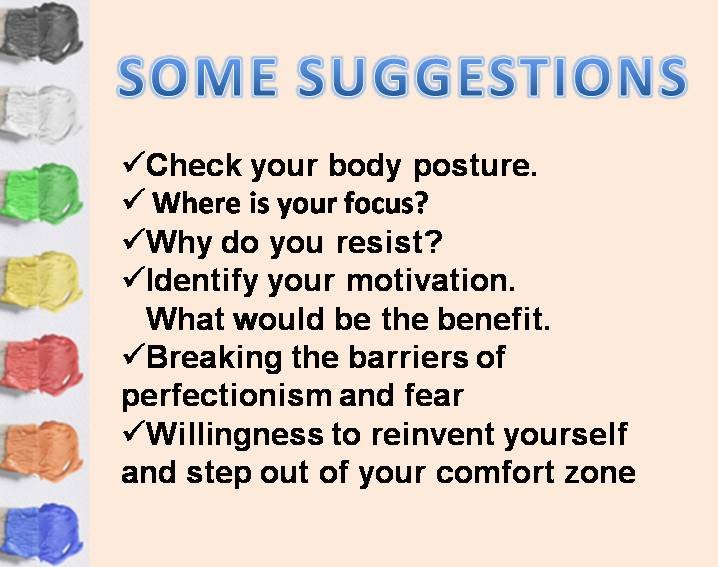

Check your body posture. The body posture speaks of us, of how we are and how we feel, this message is not only for others, it is also for ourselves, with our posture we are sending a message to the brain of that state in which we are. To illustrate this, he brought us a very eloquent image that perfectly describes this point.
Where is your focus? In what you want to achieve, in your goals or in that which prevents you from acting.
Why do you resist? Perhaps this is one of the most important questions we can ask ourselves and whose answer may require us to reflect carefully on it because when we know what causes us resistance we can work on it to get out of the situation.
Identify your motivation What would be the benefit? It is closely related to the Formula worked, when we find the benefits that an action would bring us we have our motivators.
It breaks the barriers of perfectionism and fear. These are two limitations to action. Sometimes we stop doing things because we think they should be perfect and while it is true that perfection is subjective, putting our best effort in what we do is the ideal, do not let this fear of error, to not meet expectations is tends to diminish as we move forward in a step by step, the most important thing is to start.
Willingness to reinvent yourself and get out of the comfort zone. Being in the morass of procrastination requires that we review ourselves to find there what fills us and what we are passionate about and get out of that space to which we have become accustomed, even knowing that we can transform ourselves.
To close, she reminded us of these three key words to achieve these changes.
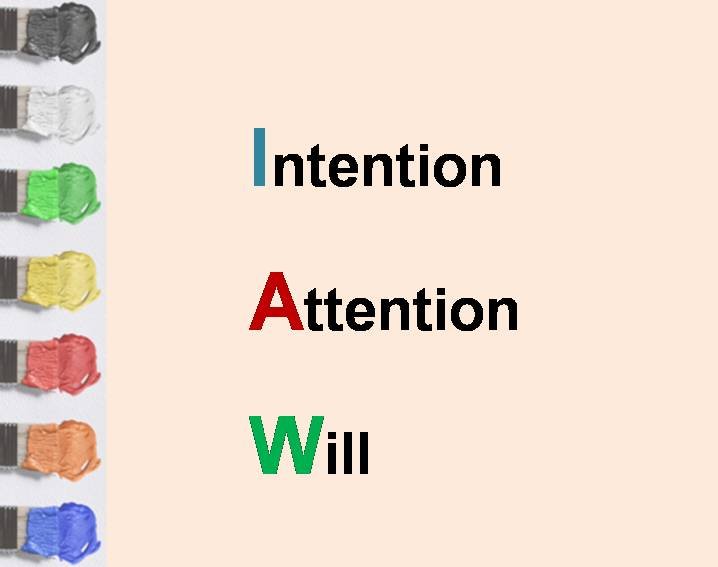
As we can see, procrastination takes away our energy and vitality, it turns off our motivation and enthusiasm, taking away our internal and external wellbeing. Paying attention to it and working on it is a great goal because the Art of Living lies in making each day the best day.

Translated with www.DeepL.com/Translator (free version)
Fuente de imagenes: Archivo personal. caricatura



Nada debe ser mas saludable, que desechar aquello que sabemos que nos perjudica. Tendia a procrastinar mucho en mi juventud por pereza y baja tolerancia a la frustración, la experiencia me ha enseñado a erradicar este mal habito. Excelente publicación!
Digan lo que quieran sobre la productividad, pero al final del día vivimos para los momentos de ocio 😋
The rewards earned on this comment will go directly to the people sharing the post on Twitter as long as they are registered with @poshtoken. Sign up at https://hiveposh.com.
Congratulations @damarysvibra! You received a personal badge!
Participate in the next Power Up Day and try to power-up more HIVE to get a bigger Power-Bee.
May the Hive Power be with you!
You can view your badges on your board and compare yourself to others in the Ranking
Check out the last post from @hivebuzz:
Un tema muy actuala miga @damarysvibra, y el programa estuvo buenisismo y tambien la musica.
Un abrazo
No hay manera de que se hubiese podido hacer un resumen tan excelente con tantas lecciones de vida de esa noche como éste.
Te felicito @damarysvibra y encantado con la invitación y con haber pasado unos momentos entre amigos y en crecimiento.
Saludos y bendiciones par todos los Holos!
Gracias por el Resumen. No llegué a tiempo para el programa. Pero acá encontré todo lo necesario.
Interesante la definición, debo confesar que lo tenía claro.
Muchas Gracias por todas las herramientas compartidas en esta publicación 🙏
Saludos @graciadegenios me alegro que te gustara el resumen. 😊
Has sido curado por @visualblock / You've been curated by @visualblock
Bienvenidas delegaciones / Delegations welcome
Encuentra nuestra comunidad aquí / Find our community here
Trail de Curación / Curation Trail
@tipu curate 6
Upvoted 👌 (Mana: 0/48) Liquid rewards.
He vivido la procrastinación en algunas etapas de mi vida, sobre todo en los tiempos de mi juventud. Una de las razones fue el aburrimiento, apenas pensaba en lo tedioso de la tarea dudaba en empezar. Por otro lado, también hacía su aparición la inseguridad y luego la frustración. Sin embargo, estas situaciones las he ido subsanando y ahora procrastinar está más lejos de mi, trato de que no me pase. Hay que actuar para hacerle frente a las cosas que debemos hacer.
La inseguridad y exceso de perfección nos hace procrastinar. Es todo un reto tomar riendas de nuestra vida y volver a tomar acción sobre lo que debemos hacer, allí la voluntad juega un papel muy importante.
Todos en algún momento hemos sufrido en mayor o menor medida, esto de la procrastinación, hay muchos factores pero al final del día, una de las cosas mas desagradables es fallarse a uno mismo, da cierto pesar porque, a los demás de pronto podemos engañar pero no a nosotros mismos. Sin embargo, hay herramientas y esos tips que encuentro en este post son valiosisimos. Gracias por compartir
Tremendo tema lo desconocia y si somos asi talvez por muchas razones que tienen que ver con nuestra crianza y nuestro entorno, nos cercamos en la zona de conford para no enfrentar el mundo.